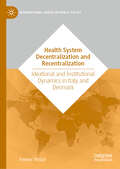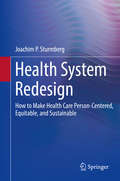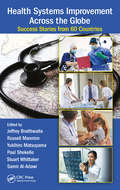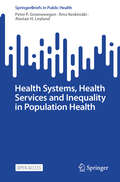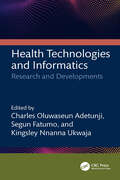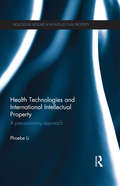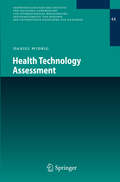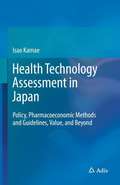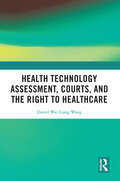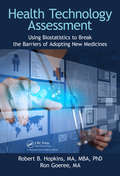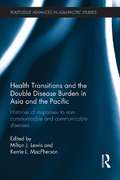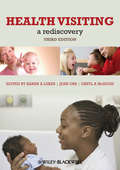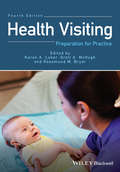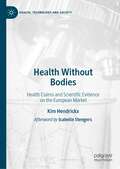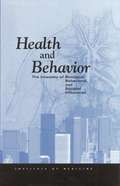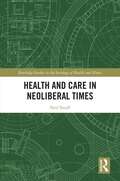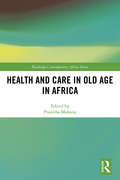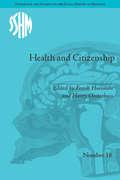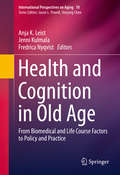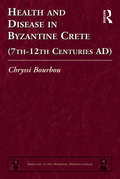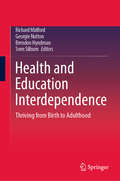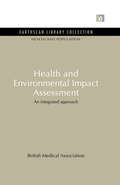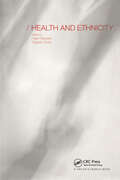- Table View
- List View
Health System Decentralization and Recentralization (International Series On Public Policy)
by Andrea TerlizziThis book explores the dynamics of health system decentralization and recentralization, investigating why and how the territorial organization of health systems changes or remains stable over time. Drawing from historical and discursive institutionalism, the explanatory framework revolves around the role of ideas, discourse and institutions. Through the analysis of the Italian and Danish health systems, the book corroborates the value of combining ideational and institutional accounts in explaining institutional continuity and change, offering new empirical and theoretical insights into the study of public policy making. The book will be of use to students and scholars interested in health politics and policy, federalism and decentralization, and theories of institutional change.
Health System Redesign
by Joachim P. SturmbergThis forward-looking volume challenges professionals and interested lay readers to reconsider our ways of looking at health and wellness, illness and disease, and the goals of health/healthcare systems. Reframing health systems as complex adaptive systems, the book identifies health care as a central aspect of social care and security for all people, particularly the most vulnerable. From there, the author outlines necessary organizational, design, medical, and community steps toward building health systems that view and practice health care as a human right and can produce optimum care in the long term. And extensive illustrations display effective collaborative problem solving within these systems, in both intriguing theoretical models and the real world. Highlights of the coverage: #65533; Systems and complexity thinking in health and health care #65533; Redesign based on "first principles" #65533; Redesign from an organizational perspective #65533; Working together effectively and efficiently to achieve a common purpose #65533; Analyzing "the workings" of health systems as complex adaptive systems #65533; Person-centered, equitable, and sustainable health systems: achieving the goal Health System Redesign brings a voice and a vision to the most pressing problems in healthcare service delivery, and offers new goals and purpose to health policymakers, health financiers, organizational leaders, clinicians, and concerned members of the local community
Health Systems Improvement Across the Globe: Success Stories from 60 Countries
by Jeffrey Braithwaite Russell Mannion Yukihiro Matsuyama Paul Shekelle Stuart Whittaker Samir Al-AdawiFollowing on from 2015’s Healthcare Reform, Quality and Safety: Perspectives, Participants, Partnerships and Prospects in 30 Countries, this book encompasses a global perspective on healthcare while shifting the focus from reform to showcasing success stories of healthcare systems worldwide. It provides explanations of why various facets of healthcare systems work well in different contexts and offers the reader alternative models for consideration. The book features contributions from 60 countries, going much further than the common practice of focusing on affluent Western nations, to provide a comprehensive exploration of the success of healthcare systems globally. The majority of literature on health-sector improvement attempts to address the problems within systems, relating the errors that can and do occur, for example, and offering solutions and preventative strategies. This book of country case studies will approach the enhancement of health systems, patient safety and the quality of care in a new and innovative way, comprehensively surveying and synthesizing the success stories of healthcare systems around the world, utilizing Hollnagel’s Safety-II approach to acknowledge the importance of exploring what goes right, what works well, and why it works. These success stories may include reference to macro, meso or micro levels of healthcare systems, various sectors (e.g., aged care, acute care or primary care), or specific programs or projects. Health System Improvement Across the Globe: Success Stories from 60 Countries is unprecedented in terms of both reach and positive emphasis, and as such will be instrumental in changing ways of thinking about and guiding health-sector improvement.
Health Systems, Health Services and Inequality in Population Health (SpringerBriefs in Public Health)
by Alastair H. Leyland Peter P. Groenewegen Ilmo KeskimäkiThis open access book shows the scientific and policy-added value of combining health systems, health services and population health research. In doing so the authors create awareness among researchers to look beyond the boundaries of their own discipline and promote cross-disciplinary collaboration. The book also gives an overview of what is known in the scientific literature about the relationships between the structure of health systems, health service provision and utilisation, and inequalities in population health. Health inequalities are unjust and avoidable and, as a focus of health policy in many governments, are widely studied in public health research. But studies of health inequalities too often ignore the role that health systems and health services play in the production of inequalities in population health and, as a consequence, their potential to create or reduce inequalities in health. Studies of inequalities in health often incorporate the social determinants of health. The same societal structures that form the social determinants of health also determine the health system structure and their impact on access to and the provision of health services and the benefits of health service use to patients with different socioeconomic backgrounds. This means that attempts to reduce health inequalities by addressing the social determinants of health must also consider the potential pathway through the health system and the provision of health services. In the final chapter the authors discuss ways of breaking down the barriers between the three approaches. After reading this compact volume, researchers will be more aware of the theoretical and methodological approaches in the three areas and more inclined to look beyond the boundaries of their own discipline. Health Systems, Health Services and Inequality in Population Health is essential reading for researchers in health systems research, health services research and population health research. In addition, the brief is relevant for health policy researchers, health impact researchers, health economists, epidemiologists, public health practitioners and professionals in health services planning and management.
Health Technologies and Informatics: Research and Developments
by Charles Oluwaseun Adetunji Segun Fatumo Kingsley Nnanna UkwajaHealth Technologies and Informatics: Research and Developments provides a comprehensive overview of mobile health applications, biodata management and analytics, medical imaging, personalized and public health systems, and biosignal processing.With a focus on medical informatics, which has been identified as a necessity relating to health challenges relevant to the current pandemic, this book highlights engineering applications and methodologies involved in data evaluations. Detailed information is provided on diseases which could be monitored and necessary intervention for the treatment of these diseases or medical conditions.Features: Provides recent advances on research and developments in the field of biomedical and health informatics Introduces topics such as mobile messaging, objectified information exchange, SmartCare, IoT-driven healthcare, cybersecurity issues, AI-enhanced healthcare, and so forth Covers novel engineering applications and methodologies involved in the pertinent data evaluations Includes dedicated chapters on machine learning in management and mitigation of COVID-19 Explores the role of extended reality in health care including virtual, augmented, and mixed reality This book is aimed at researchers and graduate students in biomedical and computer engineering.
Health Technologies and International Intellectual Property Law: A Precautionary Approach (Routledge Research in Intellectual Property)
by Phoebe LiThe global transmission of infectious diseases has fuelled the need for a more developed legal framework in international public health to provide prompt and specific guidance during a large-scale emergency. This book develops a means for States to take advantage of the flexibilities of compulsory licensing in the Agreement on Trade-Related Aspects of Intellectual Property Rights (TRIPS), which promotes access to medicines in a public health emergency. It presents the precautionary approach (PA) and the structure of risk analysis as a means to build a workable reading of TRIPS and to help States embody the flexibilities of intellectual property (IP). The work investigates the complementary roles of the World Health Organization (WHO) and the World Trade Organization (WTO) in order to promote the harmonisation of the precautionary approach in relation to the patenting of crucial pharmaceutical products. By bringing together international trade law and intellectual property law Phoebe Li demonstrates how through the use of risk analysis and the precautionary approach, States can still comply with their legal obligations in international law, while exercising their sovereignty right in issuing a compulsory licence of a drug patent in an uncertain public health emergency. This book will be of great interest to students and academics of medical and healthcare law, intellectual property law, international trade law, and human rights law.
Health Technology Assessment
by Daniel WidrigDas Buch befasst sich mit den weltweit laufenden Bemühungen, Health Technology Assessment (HTA) im Gesundheitswesen zu etablieren. Der Autor stellt die historische Entwicklung von HTA dar und präsentiert eine sorgfältige Definition des Begriffes. Dazu gehört eine kritische Auseinandersetzung mit den Grundprinzipien von HTA sowie der damit verknüpften rechtlichen Aspekte. Neben Aufbau und Unterarten von HTAs wird zudem ein Lösungsansatz vorgestellt, um HTA-Arten klar voneinander abzugrenzen. Ein Grossteil der Arbeit umfasst eine zugängliche Einführung in die an HTA beteiligten Disziplinen. Zudem werden ausgewählte nationale und internationale HTA-Agenturen porträtiert. Überlegungen zur ,,Best-Practice" und ein dreistufiger Lösungsansatz zur Implementation von HTA runden das Werk ab. Es ist das erste Werk, dass sich in so ganzheitlicher Weise mit der Thematik auseinandersetzt.
Health Technology Assessment in Japan: Policy, Pharmacoeconomic Methods and Guidelines, Value, and Beyond
by Isao KamaeRepresenting the first book on the topic, this work offers the reader an introduction to the Japanese systems for health technology assessment (HTA) officially introduced by the Ministry of Health, Labour and Welfare (MHLW) in 2016. Policy and guidelines are discussed, with the relevant methods and conditions of cost-effectiveness analysis explained alongside. Numerous instructive examples and exercises, ranging from basic to advanced, impart valuable knowledge and insight on the quantitative methods for economic evaluation, which will appeal to both beginners and experts.This guidebook is authored by Japan’s foremost expert in HTA and pharmacoeconomics, with a view to strengthening the reader’s expertise in value-based healthcare and decision-making. The methods presented are essential to informing regulatory, local and patient decisions; as such, the book is equally recommended to industry and government, as well as academia, and anyone with an interest in Japanese HTA.
Health Technology Assessment, Courts and the Right to Healthcare
by Daniel Wei WangBoth developing and developed countries face an increasing mismatch between what patients expect to receive from healthcare and what the public healthcare systems can afford to provide. Where there has been a growing recognition of the entitlement to receive healthcare, the frustrated expectations with regards to the level of provision has led to lawsuits challenging the denial of funding for health treatments by public health systems. This book analyses the impact of courts and litigation on the way health systems set priorities and make rationing decisions. In particular, it focuses on how the judicial protection of the right to healthcare can impact the institutionalization, functioning and centrality of Health Technology Assessment (HTA) for decisions about the funding of treatment. Based on the case study of three jurisdictions – Brazil, Colombia, and England – it shows that courts can be a key driver for the institutionalization of HTA. These case studies show the paradoxes of judicial control, which can promote accountability and impair it, demand administrative competence and undermine bureaucratic capacities. The case studies offer a nuanced and evidence-informed understanding of these paradoxes in the context of health care by showing how the judicial control of priority-setting decisions in health care can be used to require and control an explicit scheme for health technology assessment, but can also limit and circumvent it. It will be essential for those researching Medical Law and Healthcare Policy, Human Rights Law, and Social Rights.
Health Technology Assessment: Using Biostatistics to Break the Barriers of Adopting New Medicines
by Robert B. Hopkins MA MBA PhD Ron Goeree MAThe term health technology refers to drugs, devices, and programs that can improve and extend quality of life. As decision-makers struggle to find ways to reduce costs while improving health care delivery, health technology assessments (HTA) provide the evidence required to make better-informed decisions.This is the first book that focuses on the s
Health Transitions and the Double Disease Burden in Asia and the Pacific: Histories of Responses to Non-Communicable and Communicable Diseases (Routledge Advances in Asia-Pacific Studies)
by Milton J. Lewis Kerrie L. MacPhersonChronic diseases—cardiovascular disease, cancer, chronic respiratory disease and diabetes—are not only the principal cause of world-wide mortality but also are now responsible for a striking increase in the percentage of sickness in developing countries still grappling with the acute problems of infectious diseases. This "double disease burden" poses demanding questions concerning the organisation of health care, allocation of scarce resources and strategies for disease prevention, control and treatment; and it threatens not only improvement in health status but economic development in the many poorer countries of the Asia Pacific region. This book presents an historical account of the development of the double disease burden in Asia and the Pacific, a region which has experienced great economic, social, demographic and political change. With in-depth analysis of more than fifteen countries, this volume examines the impact of the double disease burden on health care regimes, resource allocation, strategies for prevention and control on the wealthiest nations in the region, as well as the smallest Pacific islands. In doing so, the contributors to this book elaborate on the notion of the double disease burden as discussed by epidemiologists, and present real policy responses, whilst demonstrating how vital health is to economic development. Health Transitions and the Double Disease Burden in Asia and the Pacific will be of great value to both scholars and policy makers in the fields of public health, the history of medicine, as well as to those with a wider interest in the Asia-Pacific region.
Health Visiting: A Rediscovery
by Karen A. LukerThis timely and relevant new edition of an established and well-regarded text is essential reading for those training to become health visitors and those who are practitioners working with and in the community. Health Visiting: A Rediscovery has been thoroughly revised and updated to reflect the many new developments in health policy, public health priorities and health visiting practice. The focus of the book, however, remains the same: placing the health visitor at the forefront of supporting and working with children and families, ensuring the child has the best possible start in life. The increasing importance of working with communities and reaffirming the public health role of the health visitor are discussed and debated. The new edition takes into account the challenges and increasing need for health visitors to engage with research evidence and to evaluate their practice. Key features: Incorporates the practice of public health and working with communities Includes a brand new chapter on the importance of safeguarding children and the enhanced child protection role of the health visitor Timely and topical Essential reading for all nurses working in the community, those training as Specialist Community Public Health Nurses and undergraduate students undertaking public health, primary and community care course units Features case studies and learning activities
Health Visiting: Preparation for Practice
by Gretl A. Mchugh Karen A. Luker Rosamund M. BryarThe fourth edition of this seminal text retains its focus on placing the health visitor at the forefront of supporting and working with children, families, individuals and communities. Health Visiting: Preparation for Practice has been fully revised and updated to reflect the changes and developments in health policy, public health priorities, and health visiting. It considers the public health role of the health visitor, and the important role and responsibilities the health visitor has with safeguarding children to ensure the child has the best possible start in life. Key features: Fully updated throughout, with new content on practice and policy developments Takes into account the challenges and changing role of the health visitor, and the need to ensure that their practice is evidenced-based Includes an additional chapter on working in a multicultural society with a discussion on some of the challenges faced by health visitors Discusses and debates the practice of public health and working with communities Examines the role of the health visitor with safeguarding and child protection, as well as working within a multi-professional team Features case studies and learning activities Health Visiting: Preparation for Practice is essential reading for student health visitors, public health nurses, and those on community placements, as well as other health practitioners working with and in the community.
Health Without Bodies: Health Claims and Scientific Evidence on the European Market (Health, Technology and Society)
by Kim HendrickxHealth Without Bodies invites readers on an ethnographic exploration of the boundary between food and medicine. Food-related health claims are governed in the EU as voluntary statements on food labels to help consumers make ‘informed choices’. This poses an interesting problem: when claims refer to health, one can no longer ignore that consumers have bodies. Asking how these claims have become possible as a new kind of truth-statement on the market, this book reveals the contours of a fundamental tension between what is expected from consumers in a liberal market economy, and how food and the body come to trouble those expectations. In doing so, it illuminates why the difference between food and medicine is such a sensitive issue, and why seemingly trivial health claims have been subject to so much debate and political control.
Health Workforce Governance: Improved Access, Good Regulatory Practice, Safer Patients (Law, Ethics And Governance Ser.)
by Stephanie D. ShortWith increasing recognition of the international market in health professionals and the impact of globalism on regulation, the governance of the health workforce is moving towards greater public engagement and increased transparency. This book discusses the challenges posed by these processes such as improved access to health services and how structures can be reformed so that good practice is upheld and quality of service and patient safety are ensured. With contributions from regulators, academics, lawyers and health professionals, this book presents arguments from multiple perspectives. Of global relevance, it brings together concerns about access, quality and safety within the framework of the health workforce governance continuum and will be of interest to policy makers, regulators, health professionals, academics legal practitioners, insurers, students and researchers.
Health and Behavior: The Interplay of Biological, Behavioral, and Societal Influences
by National Research CouncilHealth and Behavior reviews our improved understanding of the complex interplay among biological, psychological, and social influences and explores findings suggested by recent research-including interventions at multiple levels that we can employ to improve human health. The book covers three main areas: What do biological, behavioral, and social sciences contribute to our understanding of health-including cardiovascular, immune system and brain functioning, behaviors that influence health, the role of social networks and socioeconomic status, and more. What can we learn from applied research on interventions to improve the health of individuals, families, communities, organizations, and larger populations? How can we expeditiously translate research findings into application?
Health and Care in Neoliberal Times
by NEIL SMALLThis book argues that neoliberal changes in health and social care go beyond resource allocations, priority setting and privatisation, and manifest in an invidious erosion of the quality of our social relationships, including relationships between care provider and care recipient. Critically examining the concept of culture and why shifts in what is considered "acceptable practice" happen, the book explores the conduct of conduct. It draws together what we know about neoliberalism’s impact on the economy and public services with research around governmentality and social change. Looking at breakdowns in the quality of care in the NHS and social care across a range of settings it holds that macro influences, such as austerity and marketisation, cannot explain everything and many of the damaging things that go on in care breakdowns occur in micro-interactions between care provider and care recipient. Analysing the interactions between the calculations of political centres, the strength of professional identities, the effectiveness of oversight and supervision and the biographies of protagonists, Neil Small problematises the focus on culture, and culture change, in our response to care failures and examines what a different approach to care might involve. Exploring the interaction of politics, economics and social change and their impact on health care and the wider welfare state, this is an important contribution for students and researchers in health and social care, sociology, political science and management studies.
Health and Care in Old Age in Africa (Routledge Contemporary Africa)
by Pranitha MaharajThis book explores health and care of the older population in Africa, focusing on policy and programmatic responses, gaps and future challenges related to health and care across the continent. The first part of the book sets the scene for the volume, profiling the demographic and health situation of the elderly in Africa. It also provides an overview of the various models of care in Africa, looking in particular at the family care model, which constitutes the main source of support for the elderly in Africa. Part 2 provides case studies from across the continent to explore varying forms of elder care as well as the health challenges facing the elderly in the different contexts. The final part considers key aspects related to older person’s experience of social pensions, which are widely recognised as a potentially powerful strategy of meeting the needs of older persons.. Identifying lessons regarding African-centric models of care, as well as reflections on the structural and policy challenges that are likely to confront countries across the continent as they strive to meet the specific needs of increasingly ageing populations, this book will be of interest to scholars of health and social care of the elderly.
Health and Citizenship: Political Cultures of Health in Modern Europe (Studies for the Society for the Social History of Medicine #18)
by Frank Huisman and Harry OosterhuisThis collection of essays looks at issues of health and citizenship in Europe across two centuries. Contributors examine the extent to which the state can interfere with the private lives of its citizens, the role of individual responsibility and if any boundary occurs in terms of what the state can realistically provide.
Health and Cognition in Old Age
by Fredrica Nyqvist Anja K. Leist Jenni KulmalaIn recent years, the aim of research on aging has shifted from prolonging life to fostering healthy and cognitively robust old age. In order to improve the quality of life of older people, we need to better understand cognitive aging as well as bodily aging. Health and Cognition in Old Age assembles the cream of research across varied medical, mental health, and social disciplines, and demonstrates how this knowledge can lead to improved outcomes for older people. The first half of this expert volume discusses biomedical and life course factors in aging, particularly as they affect cognition and well-being in later life. From there, effective solutions are the focus: interventions and care programs to improve mental functioning and general quality of life, and current policy and practice ideas in promoting healthy, active, and cognitively robust aging. Together, these diverse chapters offer a multi-faceted approach to understanding and modifying what was formerly the inevitable course of growing old. A sampling of the coverage: How the aging process affects the immune system. Occupational gerontology - work-related determinants of old age health and functioning. Social, behavioral, and contextual influences on cognitive function and decline. Lifestyle factors in the prevention of dementia. Understanding long-term care outcomes: conventional and behavioral economics. Social capital, mental well-being, and loneliness in older people. For gerontologists, sociologists, social workers, health psychologists, and others working to improve older people's lives, Health and Cognition in Old Age brings expertise, versatility, and confidence to the table.
Health and Disease in Byzantine Crete (Medicine in the Medieval Mediterranean #1)
by Chryssi BourbouDaily life and living conditions in the Byzantine world are relatively underexplored subjects, often neglected in comparison with more visible aspects of Byzantine culture, such as works of art. The book is among the few publications on Greek Byzantine populations and helps pioneer a new approach to the subject, opening a window on health status and dietary patterns through the lens of bioarchaeological research. Drawing on a diversity of disciplines (biology, chemistry, archaeology and history), the author focuses on the complex interaction between physiology, culture and the environment in Byzantine populations from Crete in the 7th to 12th centuries. The systematic analysis and interpretation of the mortality profiles, the observed pathological conditions, and of the chemical data, all set in the cultural context of the era, brings new evidence to bear on the reconstruction of living conditions in Byzantine Crete. Individual chapters look at the demographic profiles and mortality patterns of adult and non-adult populations, and study dietary habits and breastfeeding and weaning patterns. In addition, this book provides an indispensable body of primary data for future research in these fields, and so furthers an interdisciplinary approach in tracing the health of the past populations.
Health and Education Interdependence: Thriving from Birth to Adulthood
by Brendon Hyndman Richard Midford Georgie Nutton Sven SilburnThis book explores the interdependence of health and education, and how optimising this important relationship provides the foundation for achieving improved life outcomes from birth into adulthood. Adopting a multi-disciplinary approach, it draws on bio-medical, epidemiological, educational, psychological and economic evidence to demonstrate the benefits of the reflexive, positive associations between good health and educational attainment over the life course. In this, it offers readers insights into the complex nature of the nexus between health and education and how this relationship influences development. Health and Education Interdependence: Thriving from Birth to Adulthood is essential reading for education and health researchers and policymakers, teachers and public health and health promotion practitioners, as well as students studying in these fields.
Health and Education in Early Childhood
by Arthur J. Reynolds Arthur J. Rolnick Judy A. Temple Arthur J. Reynolds Arthur J. RolnickHealth and Education in Early Childhood presents conceptual issues, research findings, and program and policy implications in promoting well-being in health and education in the first five years of life. Leading researchers in the multidisciplinary fields of early learning and human capital formation explore the themes of the integration of health and education in promoting young children's well-being; the timing of influences on child development; and the focus on multiple levels of strategies to promote healthy early development. Through this, a unique framework is provided to better understand how early childhood health and education predictors and interventions contribute to well-being at individual, family community, and societal levels and to policy development. Key topics addressed in the chapters include nutritional status, parenting, cognitive development and school readiness, conduct problems and antisocial behavior, obesity, and well-being in later childhood and adulthood.
Health and Environmental Impact Assessment: An Integrated Approach (Health And Population Set Ser.)
by British Medical AssociationThis text shows why we need to develop an integrated approach to health and environmental impact assessment of development projects, and how this might be achieved. Case studies and examples are provided
Health and Ethnicity
by Prakash Shetty Helen MacbethIn modern multicultural societies, the topic of 'health and ethnicity' has become increasingly recognised as highly relevant. All too frequently, academic coverage of the topic has been scattered in specialist literature of different disciplines; a book bringing these perspectives together has so far been lacking.The aim of the book is to explain the diversity in health experience due to determinants and factors that can be described as 'ethnic'. Both 'ethnicity' and 'health' are words that have stimulated semantic debate, and yet too seldom is sufficient sensitivity given over to the complexity of the issue.
